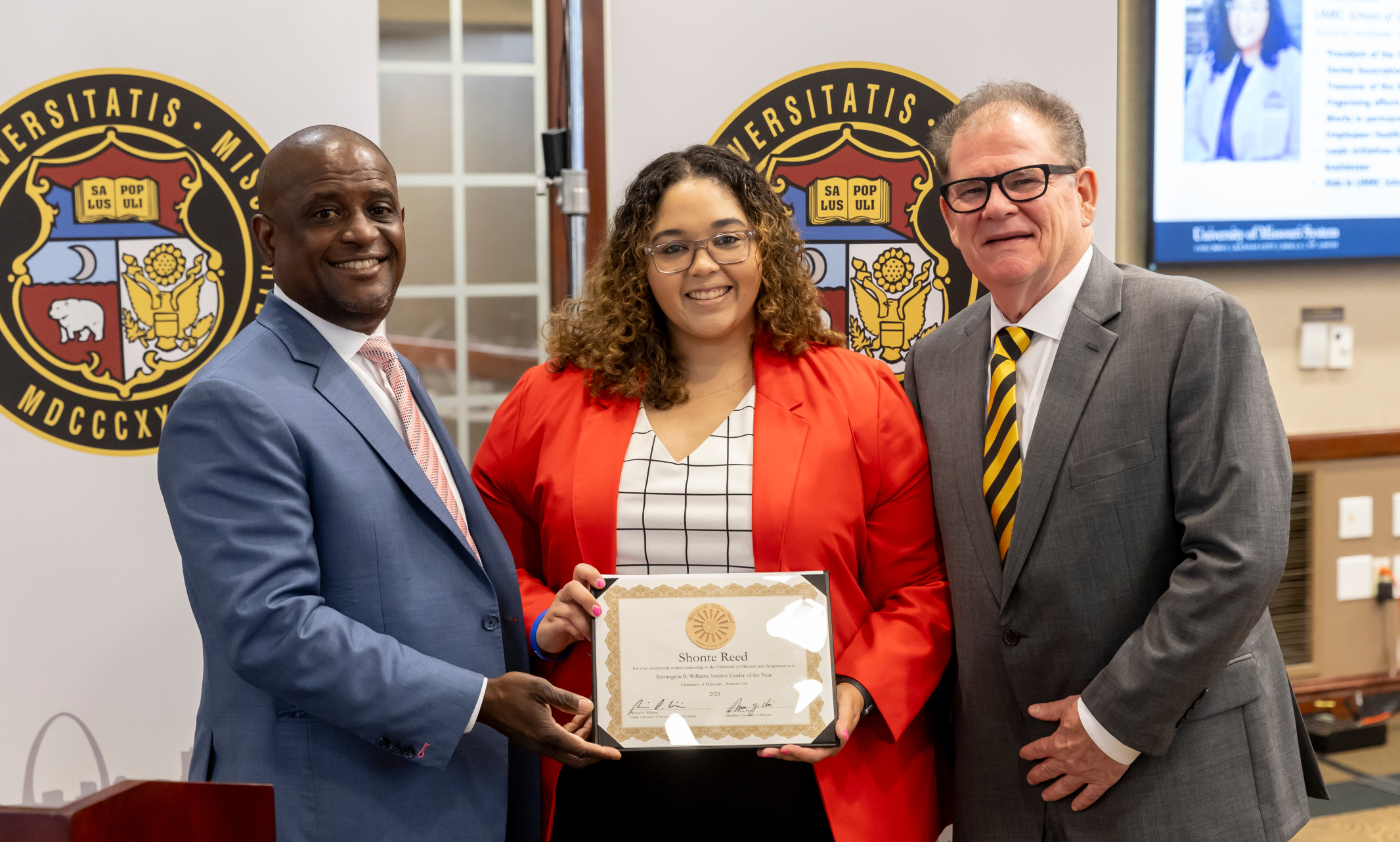
Remington R. Williams Award, named in honor of late student leader and UMKC alumnus, recognizes outstanding character and collaborative spirit
Shonte Reed, a rising fourth-year DDS student at the UMKC School of Dentistry, has been chosen to be the inaugural UMKC recipient of the Remington R. Williams Award.
She will be recognized at the June 29 Board of Curators meeting for maintaining an outstanding academic record while providing exceptional leadership and service.
UMKC alumnus Remington Williams (J.D. ’22), the student representative to the University of Missouri Board of Curators, died in a car accident last year. He was revered as a natural leader and caring human being who accomplished much, driven by a passion for helping others.
“Shonte Reed has demonstrated exceptional leadership and commitment to her classmates, and to her community,” said UMKC Chancellor Mauli Agrawal. “Her tireless efforts to encourage more young people of color to pursue careers in dentistry and other health professions are a testament to her character, and exemplify the spirit of Remy Williams.”
During her time at UMKC, Reed has served as Student Council vice president of the class of 2024; president of the UMKC Student National Dental Association/Hispanic Student Dental Association; national vice president of the Student National Dental Association; treasurer for the UMKC Dental Anesthesiology Club; and a representative on the School of Dentistry Diversity, Equity and Inclusion Council. She established a national network of prospective and current minority dental students through her social media platform and business, Black Dental Students & Pre-Dents, LLC. Faculty and staff turn to her often to counsel prospective students from underrepresented backgrounds as an ambassador for the UMKC School of Dentistry.
She mobilized the organizations she led to participate in recruitment efforts at historically Black colleges and universities; led efforts by the organization to support Black-owned businesses in Kansas City; and organized holiday toy drives for Children’s Mercy Hospital in 2021 and 2022.
Reed also has served as a mentor in the Students Training in Academia, Health, and Research (STAHR) Partnership, a collaborative of the UMKC schools of medicine, dentistry and pharmacy. The program is designed to increase the number of students from disadvantaged backgrounds entering health care programs and better prepare them for success academically and professionally.
In a letter of recommendation to the scholarship committee, Richard H. Bigham, assistant dean for student programs, wrote: “In my twenty plus years of working in higher education, she is the most exceptional student I have ever supported and has become a transformational leader for our community.”
In addition to multiple recommendations from School of Dentistry faculty and staff, her nomination was also endorsed by Laila Hishaw, DDS, a UMKC alumna and president of the board, Diversity in Dentistry Mentorships Inc.; and Melissa Robinson, president of the Black Health Care Coalition in Kansas City.
The Remington R. Williams Awards are the highest non-academic award bestowed on students by the Board of Curators and are given in memory of his outstanding service as Student Representative to the Board (2020-2022). Recipients will be selected annually from among the four UM System universities and will receive a leadership medal to wear at graduation, a $1,000 award and an invitation to be recognized at a Board of Curators meeting.
The awards recognize exceptional student leaders who have also made an impact on their respective institution, inspired growth and development of fellow students in both academics and extracurricular activities, and exhibited outstanding character and collaborative spirit at all times.
Jun 28, 2023
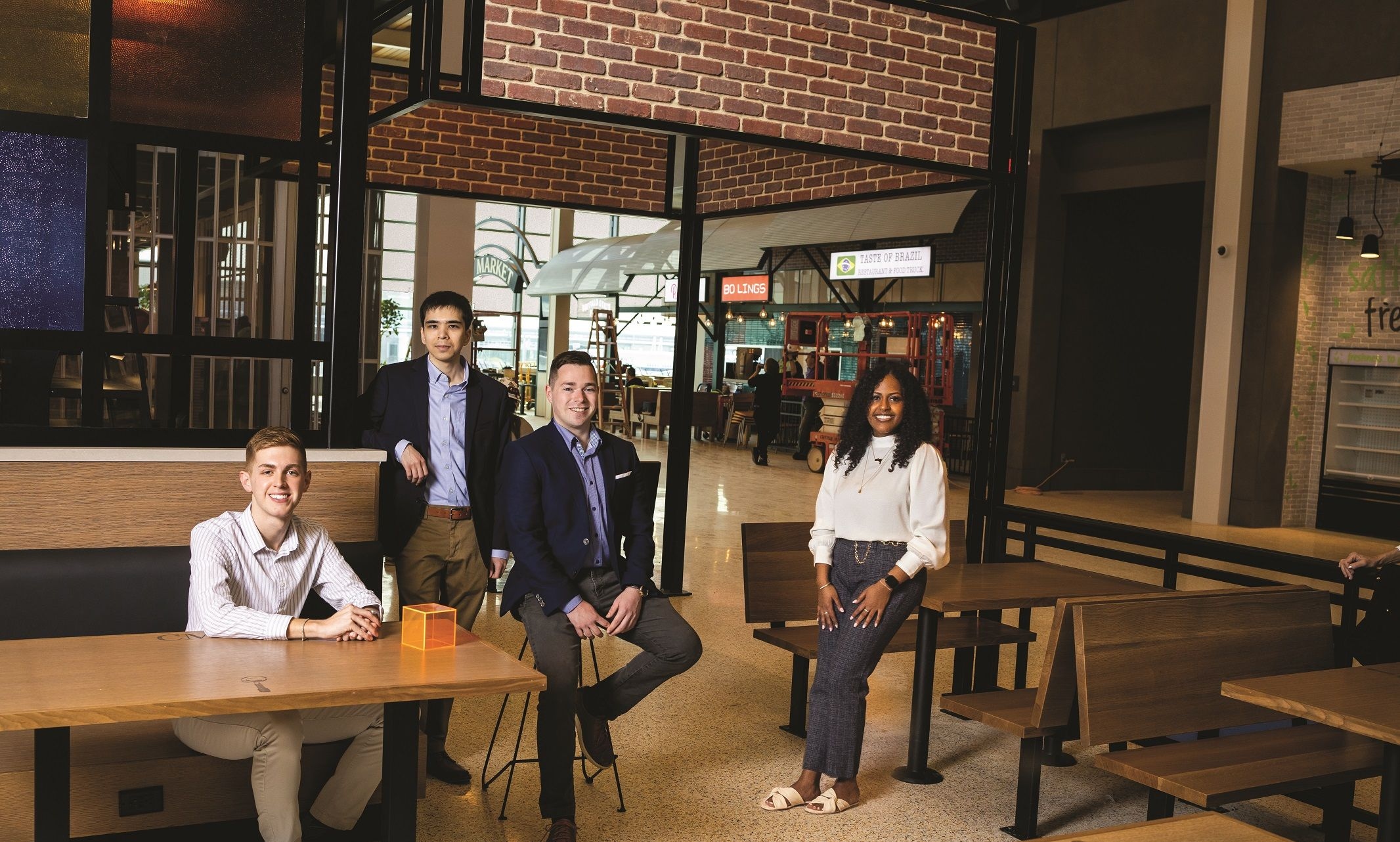
Bloch Consulting Lab creates lessons from real-world experiences
As MBA student Msgana Teklebrhan Zegeye sees it, a business consultant’s job is to learn whatever a client needs them to learn.
That’s exactly what she’s done in her job as a student consultant employed with the Consulting Lab, a new Regnier Institute initiative at the Bloch School. With generous donor support, the Lab hires students like Zegeye to serve as pro-bono consultants for Kansas City-area entrepreneurs and small businesses. Working under faculty supervision, student consulting teams provide a range of services, including market research, business plan development and financial modeling. The lab is designed to both provide opportunities for experiential learning and valuable consulting resources for the community, with a particular focus on entrepreneurs and small businesses from under-served communities. It also helps students develop critical thinking and problem-solving skills, analytic capabilities and communication skills. As part of this effort, the Lab has partnered with several organizations that work with entrepreneurs from underserved communities. These partners have been instrumental in identifying clients that might bene-fit from the Lab’s consulting resources. AltCap, G.I.F.T., the Urban League, Pipeline Pathfinders and Pathway Financial Education have all been working with the Lab to create connections with potential clients.
The Lab also partnered with Vantage Airport Group, the company overseeing concessions at the new Kansas City International Airport. During this project, Zegeye and the other students on the consulting team worked with the local businesses preparing to open inside the new concourse. For all of the Bloch Consulting Lab projects, the consulting team must first understand the client’s business and the nature of the problem that they are being asked to address. Then they must develop a thorough understanding of any unique aspects of the client’s operation.
Photo by Brandon Bland | UMKC
Working with concessionaires at the Airport, the consultants learned about special security precautions that affect how a business operates. They learned that restaurants can have knives, but only if the knives are tethered to a wall. They learned that employees must live at the address printed on their official ID and about other security requirements that might affect the available pool of employees. They learned about how the business model for a restaurant or store may need to change when operating inside an airport. They also learned about the challenges of attracting workers given the distance to the airport from where many potential employees live. “I’m not going to say problems didn’t arise,” Zegeye says of her consulting work leading up to the airport’s grand opening. “But, figuring out how to manage them has been one of the best things.” The Consulting Lab is a relatively new Bloch School initiative, opening just last summer. Friends of the school have provided both philanthropic support and creative ideas about how the Lab can be most impactful, both for students and the community. Mike Plunkett, co-founder of PayIt and chair of the Bloch Advisory Board, led productive brainstorming sessions with the Bloch Advisory Board about how to launch and support the Lab. Young Sexton, founder of WingGate Travel and the Sexton Family Foundation, advocated for leveraging student expertise to help underserved entrepreneurs accelerate growth at key stages of the entrepreneurial development cycle. Roger Nelson, former deputy chairman of Ernst & Young, developed processes for the Lab to support application-based learning and to enhance the effectiveness of consulting services. Jeffrey S. Hornsby, director of the Regnier Institute and the Henry W. Bloch Endowed Chair of Entrepreneurship, is one of the faculty members overseeing student consulting teams. According to Hornsby, “This is the perfect project for a school with a strong commitment to community engagement, one that reflects Henry Bloch’s long-standing vision for the school.” In addition to their work at the airport, consulting teams worked with several clients identified through other organizations. This included projects for an entrepreneur with a strong, on-going business who wanted to expand via diversification into a related line of business, a technology firm in early startup mode who needed assistance with its business plan and a new venture that needed assistance with brand development.While working with the Consulting Lab, students are assigned to teams and supervised by a Bloch School professor. The Lab, which plans to employ between 30 and 40 students annually in future years, is open to students from across business disciplines, which means the Lab will be able to offer a variety of services.“It really offers great experience for students,” says Marvin Carolina, Jr., an assistant teaching professor who worked with the team of students assigned to the airport. “This is real time. This is real business. This is real life.” With every project, student consultants start by listening to what their client is looking for and understanding their business goals. From there, they consider how best to provide support. The student consulting team also highlighted how their work with other clients helped prepare them for the work with the airport vendors. Erik Klaas suggested that, “Over the summer, I was able to work with businesses and entrepreneurs in their early start-up stages. Those early experiences in working with small businesses provided me with a great foundation for taking on the airport project.”“Most of these students have worked in jobs where they’ve earned a wage and gotten a W-2,” says Bruce Snyder, a faculty advisor to the lab who spent more than 30 years at Ernst & Young, a business management consultant firm based in Kansas City. “But to talk to a business owner and understand what it takes to succeed is not something out of a textbook where you’re given the facts and the numbers. These are not, by any means, textbook cases. They’re very fluid.” “Helping businesses in urban, underserved communities overcome obstacles, to become stronger and cre-ate jobs will make communities stronger,” says Snyder. “Economic growth is the key to any successful urban community.”
From the Bloch students’ perspectives, the Consulting Lab is also designed to provide hands-on experience that will help them compete for top jobs when they’re ready to enter the business world.Henry Meeds, who is majoring in management and accounting, says the experience he gained while working with the Consulting Lab helped him land a permanent job in New York City. When he graduates this spring, Meeds will step into a consulting position with PwC, one of the country’s top consulting firms.“We’re getting hands-on experience during every part of the project,” Meeds says of his team’s work at the airport. “We’re doing things that maybe a partner would be doing at PwC.”Nicolas Hartung, another student on the airport project, says the consulting work has made him a more confident communicator.“In January, we went (to the airport) and delivered our project to all of the concession owners and opera-tors there,” he says. “It was a really cool experience because we saw how we’re helping them firsthand, and that they were actually going to take our advice and learn from it.”As part of the experience, students learn to sell themselves, Snyder says. Although the lab doesn’t charge clients, students need to persuade clients to give them the time it takes to provide consulting for their businesses. Some clients realize that the students’ ages and perspectives can offer perfect measure for how their business plan will be received.“Being candid, we’ve had some businesses come to us with what they think is a good strategy or a good development, but we’re scratching our heads and wondering how this would work,” Snyder says. “Then the businesses realize that if the students, who represent the demographic group they may be targeting don’t understand, it’s unlikely the general public will.”Gaining a new perspective was a big reason Vantage’s general manager, Lovell Holloway was excited for the opportunity to work with Bloch’s student consultants. “This is a once-in-a-generation opportunity and our vision was, how do we bring more people along?” Holloway recalls. “We have legacy behaviors around staffing, economic impact studies and internships. We wanted to break the norm.”Holloway asked students to get involved in each of those areas as his company opened concessions at the airport.“Having the perspectives of people from a younger generation only made sense,” he says. “They’d have fresh ideas and help us look at this from a better point of view.”
Jun 23, 2023
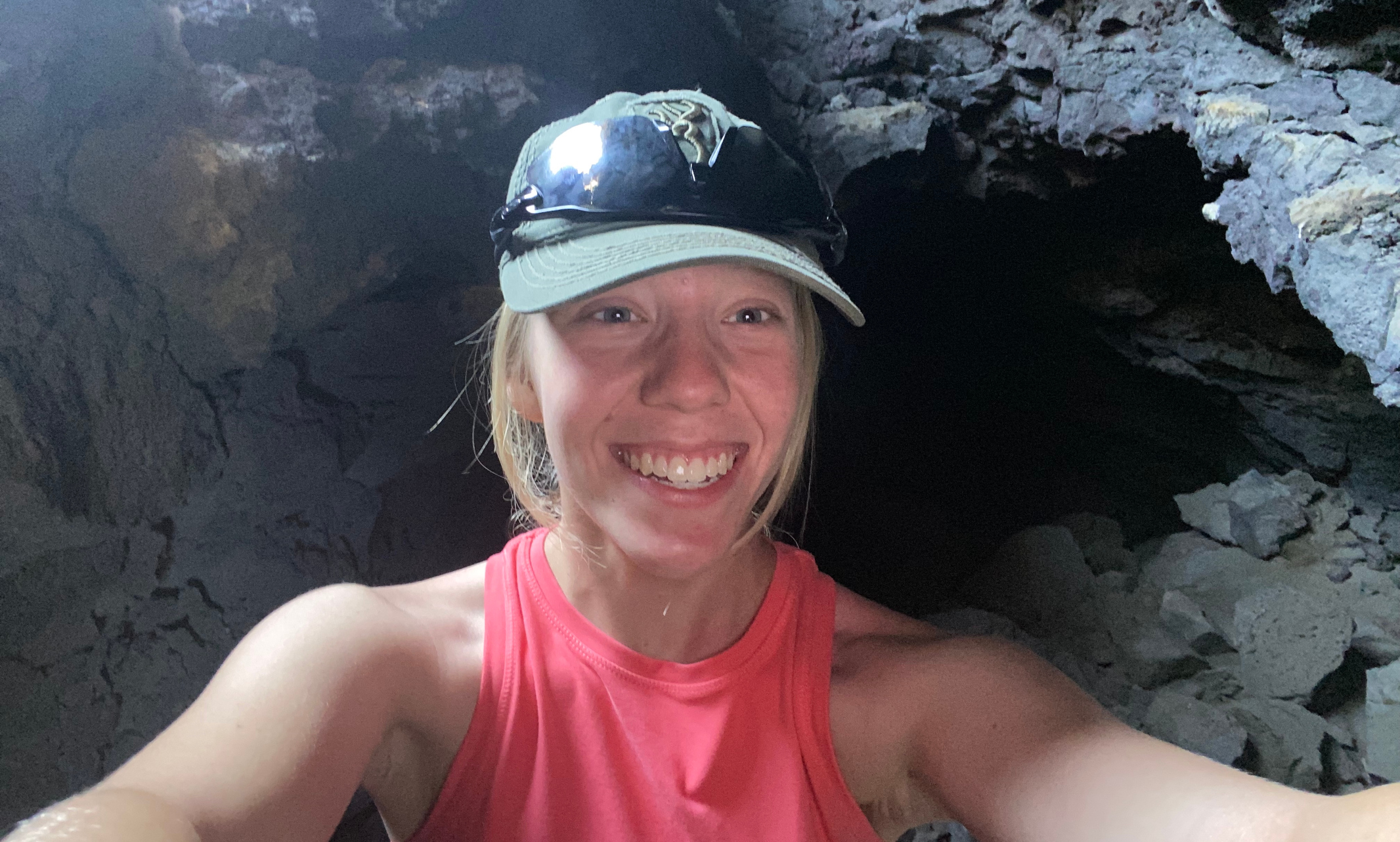
Tyler Center for Global Studies funds student research projects in Argentina, Iceland and Jordan
Three UMKC undergraduate students have received $2,000 grants from the Tyler Center for Global Studies to fund research projects in foreign countries.
Yasmeen Hanon will study international issues such as Arab-Israeli relations, regional conflicts, politics, international relations, environment and more in Amman, Jordan. Maximus Reeds will research media bias involving news coverage of the indigenous Mapuche people in Puerto Madryn, Argentina. Mya Thomas will work on creating a safer and more accurate modeling system for volcanic lava tubes at the Askja volcano in Iceland.
They are the first UMKC students to receive research funding from the Tyler Center, which works to advance global education through funding organizations and programs that support international education, innovation and research, with priority given to Pell-eligible students.
Maximus Reeds, Argentina
Reeds, of Lee’s Summit, launched his project in the capstone seminar program in the UMKC Department of History. His ethnic background is Welsh-Argentine, and he has been following the struggles of the Mapuche people in Chile and Argentina and the Welsh people in the United Kingdom for several years.
In his preliminary research, he found significant differences in media coverage of these issues between media outlets with a nationwide audience, and those primarily serving local communities. In Argentina and Chile, he said, the national media tend to portray these issues through the lens of their individual political leanings. He also noted that violent interactions dominate coverage.
“These interpretations disregard the daily, peaceful interactions between Mapuches and Argentine and Chilean citizens, which is the focus of local newspapers.”
Mya Thomas, Iceland
Thomas is from Columbia, Missouri and is majoring in earth and environmental science with an emphasis in geology; she is also enrolled in the UMKC Honors Program and is pursuing a minor in astronomy and a certificate in geographic information systems. She will be traveling to Iceland with her research mentor, Prof. Alison Graettinger.
The basis for her research is that volcanoes are dangerous places, and not just when they erupt. Scientists often have to navigate dangerous terrain, including caves and lava collapse features, lava tubes and holes. Thomas is working on a method to create accurate digital models of features such as lava tubes.
“Understanding the nature of lava tubes is important to my academic path because my interest falls in planetary science,” Thomas said. “Studying cave environments is important to planetary science since they may be considered as living quarters for astronauts on extraterrestrial lands.”
Yasmeen Hanon, Jordan
Hanon recently received a Benjamin A. Gilman International Scholarship for her research project in Jordan. Hanon, from Kansas City, will spend this summer at CIEE in Amman, Jordan, conducting an analysis of how western and Middle Eastern media outlets perceive and portray conflicts in the Middle East. She is pursuing a double major in political science and environmental science, with an international studies minor.
Jun 23, 2023
Lessons in business for the arts, history, science, medicine and more
The Bloch School has a unique campus-wide mission: spread an entrepreneurial mind-set and business thinking across UMKC’s campus and into the broader community.
Bloch academic partnerships range from specific examples, such as the Graduate Certificate in Performing Arts Management, a joint program with the Conservatory; to more general, such as the Entrepreneurship Innovation Grant program, which supports student, faculty or staff initiatives in entrepreneurship across all academic units. These initiatives can include curriculum development, technology commercialization, school and department innovation, community engagement and ecosystem building.
The Entrepreneurship Minor, which is open to all UMKC students, brings an entrepreneurial perspective to a student’s major field of study. Students from outside the Bloch School have the option of replacing up to two electives with discipline-related entrepreneurship electives.
In addition to course work, Enactus, a student club focused on entrepreneurial public-service projects, is run from Bloch but open to students in any major.
“Only about half the students in Enactus are business majors, and the Entrepreneurship minor is the most diverse program in the Bloch school,” said Jeff Hornsby, Curators’ Distinguished Professor, Henry W. Bloch/Missouri Endowed Chair of Entrepreneurship and Director, Regnier Institute for Entrepreneurship and Innovation. “I really feel that the effort to spread entrepreneurial thinking to all corners of UMKC has been greatly reinforced by all of the cooperation we’ve received from the schools across campus.”
The Cross Campus Advisory Board works to promote a culture of entrepreneurship throughout UMKC. The group includes faculty from seven different academic units outside Bloch, plus staff from the UMKC Innovation Center.
The School of Law maintains longstanding partnerships with Bloch through the Business and Entrepreneurial Law emphasis area, including the Law, Technology and Public Policy course at the law school and the Entrepreneurial Legal Services Clinic. During the clinics, law students, who are overseen by faculty, provide legal support for startup efforts.
Students completing a B.A. degree in Urban Studies may pursue early admission to the Bloch Master of Public Administration (MPA) program while simultaneously reducing the total number of hours required to complete the MPA. Similarly, students enrolled in an undergraduate program at the School of Science and Engineering may apply for entrance to the Professional Master of Business Administration (PMBA) program at the beginning of the final year of their undergraduate program.
Students in the B.A./M.D. program at the School of Medicine can pursue the PMBA during a leave of absence after the completion of year four. Students in the School of Dentistry DDS program or the School of Pharmacy’s Pharm.D. program can pursue the PMBA simultaneously. Because the UMKC PMBA can be completed online, Pharm.D. students at any one of the three campus locations (Kansas City, Columbia, Springfield) may apply to the this program.
Jun 23, 2023
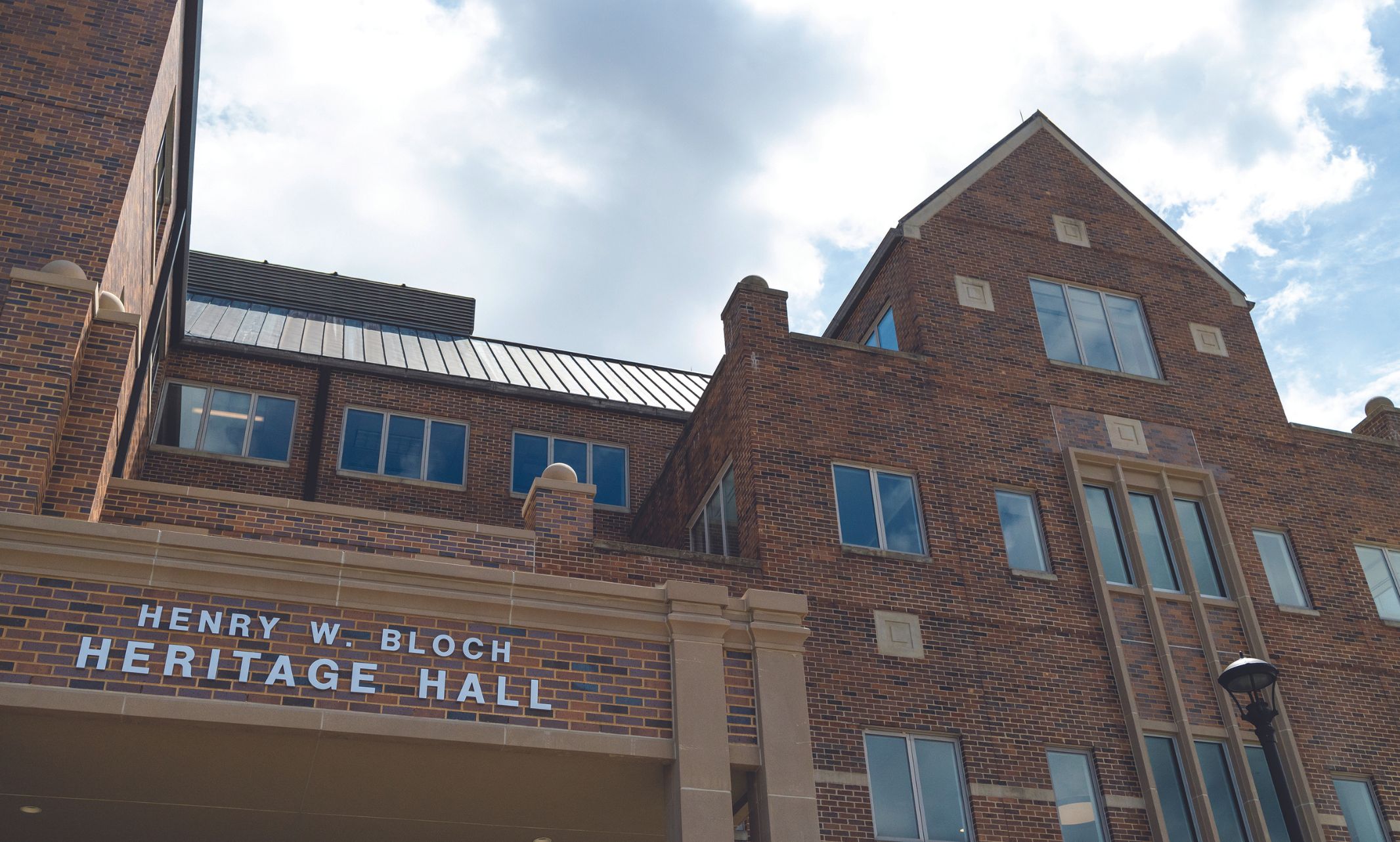
Improved Heritage Hall reopens to high praise
Last summer’s grand reopening of Bloch Heritage Hall marked a two-fold celebration, remembering Henry W. Bloch on what would have been his 100th birthday and the revitalization of a campus cornerstone. Alumni, students, university leadership, city officials, donors and members of the Bloch family all gathered for the celebration and ribbon cutting.
But now that the party is over, it’s back to class.
Bloch Heritage Hall is an amalgamation of the historic Shields Mansion, an estate built in the early years of the 20th century for grain magnate Edwin W. Shields and his wife, Martha, and a sprawling addition the university completed in 1986 with a $1 million contribution from Henry Bloch himself. With the opening of Bloch Executive Hall in 2013, Heritage Hall’s $17 million upgrade was necessary to keep up to date with the evolving school.
“The recent renovation of Bloch Heritage Hall has been a game changer, not only for our students, but for our faculty and staff as well,” says Scott Ezzell, manager of undergraduate admissions and recruitment. “Students now have a variety of indoor and outdoor spaces in Heritage Hall available to use for individual study, group collaboration or simply just to relax and socialize between classes. More students stick around between classes than ever before, and there’s a distinct energy throughout the building that wasn’t as noticeable before the renovation.”
As part of the project, the Marion H. Bloch Terrace and Park also went through a transformational beautification and enhancement, providing outstanding space for students, faculty and staff to gather and collaborate. It has also been, and will continue to be, the site for many events at the school, helping to build connections and community.
The multi-year project sought to maintain the aesthetics of the building’s historic exterior, while moving dated sections of the building’s interior into the 21st century with new offices, gathering spaces and classrooms entwined with modern technology that fosters flexible learning environments for students.
Only accelerated by the COVID-19 pandemic, the need for remote learning options has grown in recent years, as more students demand hybrid learning models to balance classwork with outside obligations. Each classroom touched by the renovation now includes such amenities as video screens, cameras and microphones, allowing access to lessons and lectures from virtually anywhere.
“The new designs and renovations make it easy for students to collaborate and work together in class to solve problems,” says Brian Klaas, dean of the Bloch School. “They give students new options for how to engage, with some joining in-person and others opting to participate virtually.”
The renovation not only improves technology but also centralizes previously hard-to-find resources into a single student services hub. From the building’s main entrance, students can now directly access valuable assets, including undergraduate advising, the career center, recruiting, tutoring and student organizations.
Designed by PGAV Architects, the hub was created by filling in two floors of an atrium — the centerpiece of the 1986 addition. Newly created floor space on the first floor created an open common area where students can mingle and meet.
“In addition to the renewed energy, students, faculty and staff are now even more accessible as a result of the new Bloch Student Services Hub. Students can now just come to the hub’s front desk to find help with anything they need,” Ezzell added. “It could be a prospective student wanting to learn more about Bloch and our programs, a current student needing class or career advice or someone wanting to visit their professor during their office hours. With most of Bloch’s faculty and services offices centrally located, we’re able to serve our students and collaborate with one another more efficiently and effectively.”
Jun 23, 2023
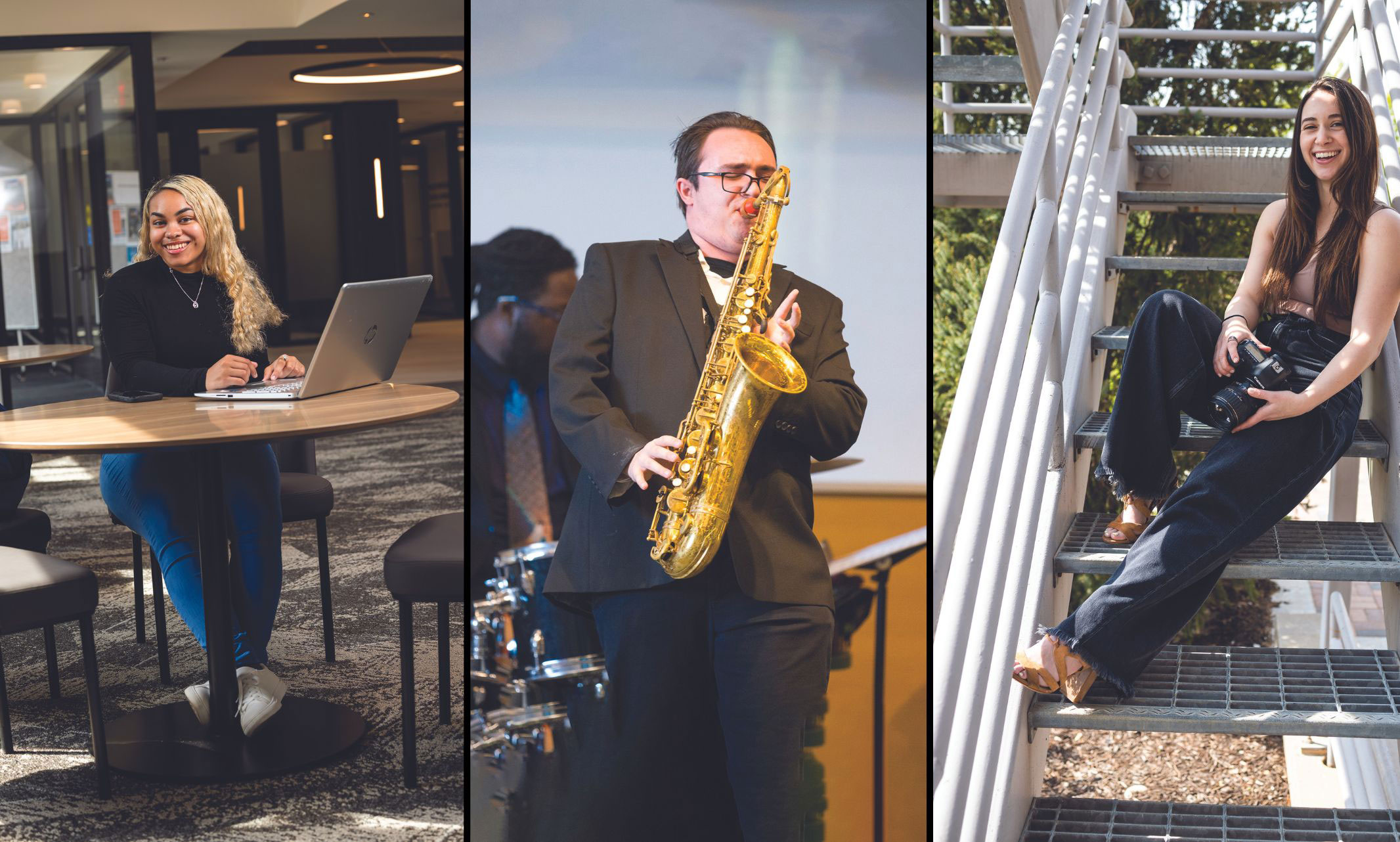
Student entrepreneurs champion the side hustle
In 2022, Americans started 400,000 new businesses every month, according to the U.S. Census Bureau. Of those, nearly 300,000 were side hustles.
Between 40 and 45 percent of Americans have a side hustle or “moonlight” at another job, and those numbers have increased significantly during the past five years. Financial gain, creative expression, autonomy and altruism are some of the many goals and objectives that motivate these entrepreneurial ventures.
“The economy, COVID-19, ownership over one’s career and individual creativity has made more people pursue side hustles,” says Alex Krause Matlack, director, Entrepreneurship Scholars (E-Scholars), assistant teaching professor and assistant director assistant director for UMKC’s Regnier Institute for Entrepreneurship and Innovation. “Some studies indicate that by the end of this decade, nearly half of individuals will be entrepreneurs because of the type of portfolio careers emerging from the gig economy industry.”
The entrepreneurial spirit that has propelled this “golden age of the side hustle” flourishes at UMKC.
UMKC Launches a Side Hustle Challenge
In 2022, the Henry W. Bloch School of Management and Regnier Institute for Entrepreneurship and Innovation introduced the first Side Hustle Challenge for UMKC students. The challenge was initiated, in part, as a response to this thriving national trend.
“We learned, through a cross-campus survey, that while only a small percentage of students were interested in being entrepreneurs, many already have side hustles,” says Matlack. “Sometimes it’s hard to self-identify as an entrepreneur, but that’s exactly what these students are doing. We wanted to find a new way to connect with students who might not think of themselves as entrepreneurs but who are doing something very entrepreneurial.”
The Side Hustle Challenge, which mirrors real-world side hustle development, both differs and dovetails with existing Bloch School and Regnier Institute programs.
“This is the first of our programs specifically targeting side hustles, or smaller businesses, students may be launching on the side,” says Matlack. “The challenge also connects to the E-Scholars program where students can launch their projects over the course of a semester.”
The challenge is an opportunity for students to pursue their entrepreneurial initiatives at a scale that allows them to continue with school. They gain knowledge and skills to develop their ideas and connect with audience wants and needs.
“Getting to know customers as a path to growth rather than riskier forms of entrepreneurship are benefits of side hustles,” Matlack says. “A venture funded by the growth of customers, rather than venture capital, is a great way to know you’ve reached product-market fit and have product customers are excited to pay for.”
Student Entrepreneurs Embrace the Side Hustle Challenge
Elle Domann, Tate Berry and Olivia Gray explored those strategies and were the inaugural Side Hustle Challenge winners.
Domann placed first in the Side Hustle Challenge with her project, Studio L, a rentable studio and coworking space for photographers and creative businesses.
“After moving to Kansas City to attend UMKC, I’ve been able to further my photography career immensely,” says Domann, who will graduate this spring with a degree in business administration, with a double emphasis in entrepreneurship and innovation and finance.
“In my hometown of Springfield, there wasn’t access to affordable resources for creative businesses like in Kansas City. Last year, I made it my mission to develop a space in Springfield where creators can work without the costs of typical studios.”
After extensive work on the space, Domann launched Studio L last October.
“I had no experience owning a brick-and-mortar store,” she adds. “It came with a lot more challenges and learning opportunities than a service-based business, like photography. The space needed renovations which was a challenge, as I had no carpenter experience. I wanted to save money, so this meant doing the work myself.”
“My favorite part of this experience is that I learn something every day. It’s a continual process of problem-solving and making changes.”
Like Domann, Berry also developed a business focused on creative professionals. His project, Musician Value Elevation, is an online platform for music business and entrepreneurship.
“Music Value Elevation is an alternative to paying thousands of dollars for music school but not acquiring the skills needed to survive,” said Berry, who will graduate this spring with a double degree in jazz studies and business marketing. “Musicians will learn how to make their ideas sustainable and provide value to others.”
Berry began developing his idea in Fall 2021 during the Bloch School Entrepreneurship Class. He refined his plans during the 2022 New Product Development course.
“The idea brought my music and business interests together,” said Berry, the 2022 UMKC Bloch School Student Entrepreneur of the Year. “My entrepreneurship classes were creative incubators that made it easier to determine my goals and find resources.”
“I learned to use design thinking in my approach and interviewed musicians and educators about music school and what they wish they’d learned. I also researched the overall value of the music industry and its untapped potential.”
After he graduates, Berry will continue to develop Musician Value Elevation and his other business ventures, including Tate’s Burnin’ Big Band.
“I need to get the capital and develop the materials and website,” he said. “Then, I’ll prototype the product so I can launch.”
In early 2022, Gray acquired her real estate license, so she could enter the challenge.
“I had no experience in real estate but taught myself the ins and outs of the industry over Christmas Break and passed the tests before Spring Semester,” recalls Gray, who will graduate with an accounting degree in 2025. “I launched this side hustle because I didn’t want to be a broke college student. Real estate seemed like a good way to make money while also being flexible, so I could still focus on my studies.”
The Side Hustle: A World of Opportunity and Discovery
In contrast to the challenge promoted by Bloch and the Regnier Institute, entrepreneurial initiatives are not always encouraged in the workplace. Until recent years, employees with side hustles, or those who “moonlight,” have been compelled to keep their pursuits under wraps. However, this mindset has seen a shift. Many organizations have recognized employee side hustles are positive for the work environment and boost employee well-being. New terms, such as “daylighting” instead of moonlighting, reflect this change.
“Some company policies still don’t allow employees to take on outside work,” Matlack notes. “However, research from Adam Grant [a nationally known organizational psychologist] supports that side hustles make employees more productive and creative.”
At UMKC, entrepreneurial explorers bring their ventures to life, and they learn about themselves in the process. As these discoveries unfold, their initial vision may transform.
“Initially, my side hustle goal was just to make money, but that has changed,” reflects Gray. “I’m now finding ways I can use my side hustle to help other people and plan to implement those within the next couple of years. My plans include renovating and selling affordable houses to people who may not have adequate funds.”
Jun 23, 2023
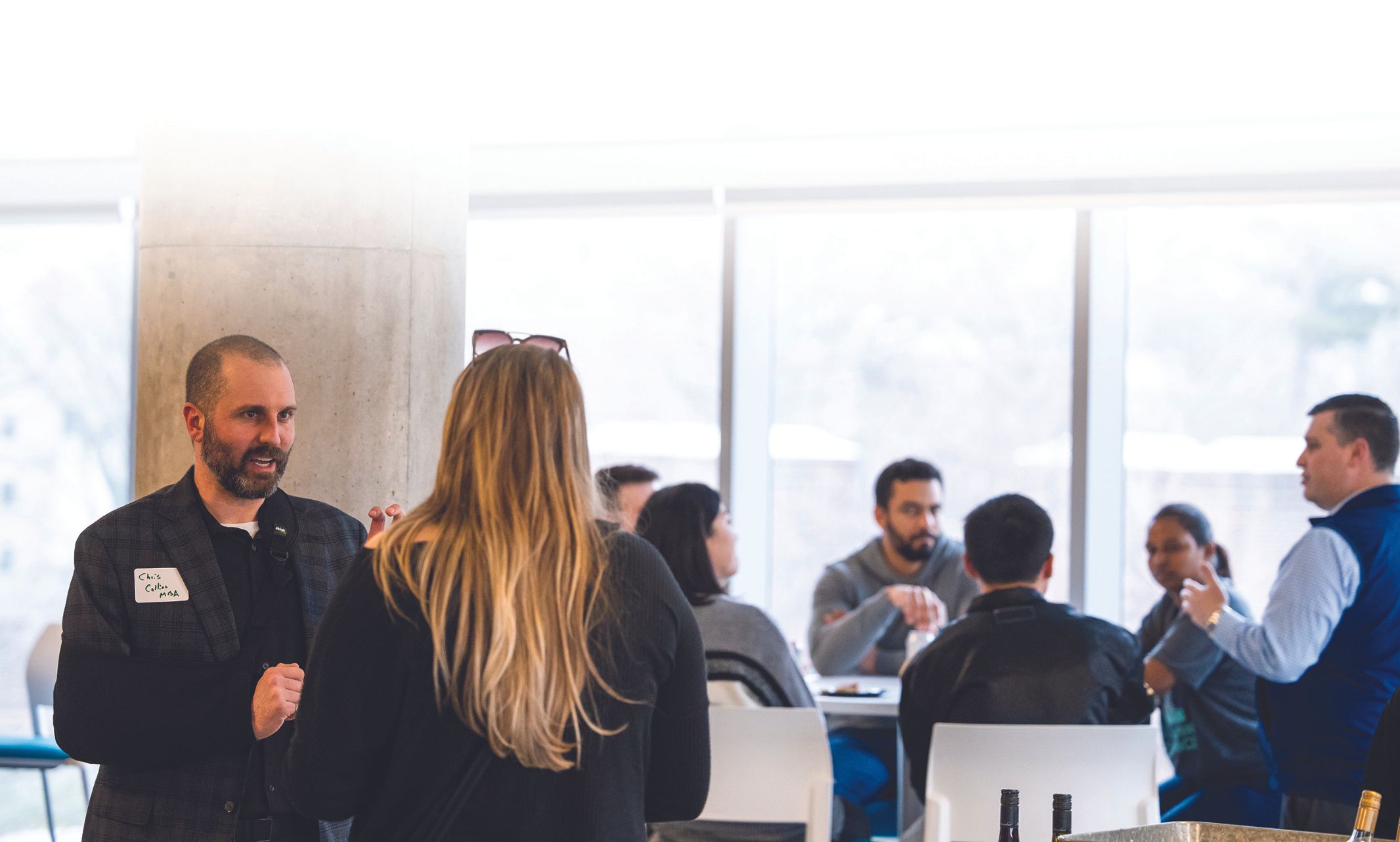
Program allows working professionals in Kansas City’s key industry sectors to customize their educational experience
The new Bloch LEAD program offers working professionals in Kansas City’s key industry sectors with the opportunity to customize their MBA. With the LEAD program, students tailor their MBA experience to allow for additional attention to the skills and competencies most critical to success in their specific industry.
As part of this new initiative, LEAD Scholars work with an executive coach to identify these skills and competencies. With their coach, they then develop a customized learning plan, drawing upon specialized coursework and curated instructional material. The structure of Bloch LEAD is also designed to provide students from a given industry with unique opportunities to build connections with leaders and working professionals in that industry.
“We are a collection of our experiences and perspectives,” remarks Stacy Cahalan, a LEAD Scholars coach. “Coaching these young professionals has been a great reminder of the incredible talent we have across so many industries and what human connection can do in our awesome city.”
“The coaching process has really been a pleasure,” says Kyle McAllister (EMBA ’21), who mentors several students. “Every student has been eager to talk and engaged in the conversation.”
Program participants also receive a scholarship and, as part of this, they create and maintain a portfolio documenting their efforts to build skills and industry connections.
Across the Fall and Spring Semesters, there are 54 scholars actively enrolled.
“I was nervous about returning to graduate school as an older student,” recalls Chris Collins, a member of the LEAD Scholars. “I was worried I wouldn’t be able to balance the coursework against responsibilities of a full-time job and family life, but I took the leap and I’m glad I did. Two semesters in and I am already applying the skills and lessons from my coursework to make a difference in my professional role.”
The LEAD Scholars program has quickly become a cross-section of knowledge, talent and ambition, bringing together early to mid-career professionals who are still hungry for more.
“Not only has the program provided me with essential tools and insights,” says LEAD Scholar Jesus Cervantes, “but it has also connected me with a group of ambitious and motivating peers who share a common enthusiasm for creating positive change in our communities.”
Jun 22, 2023
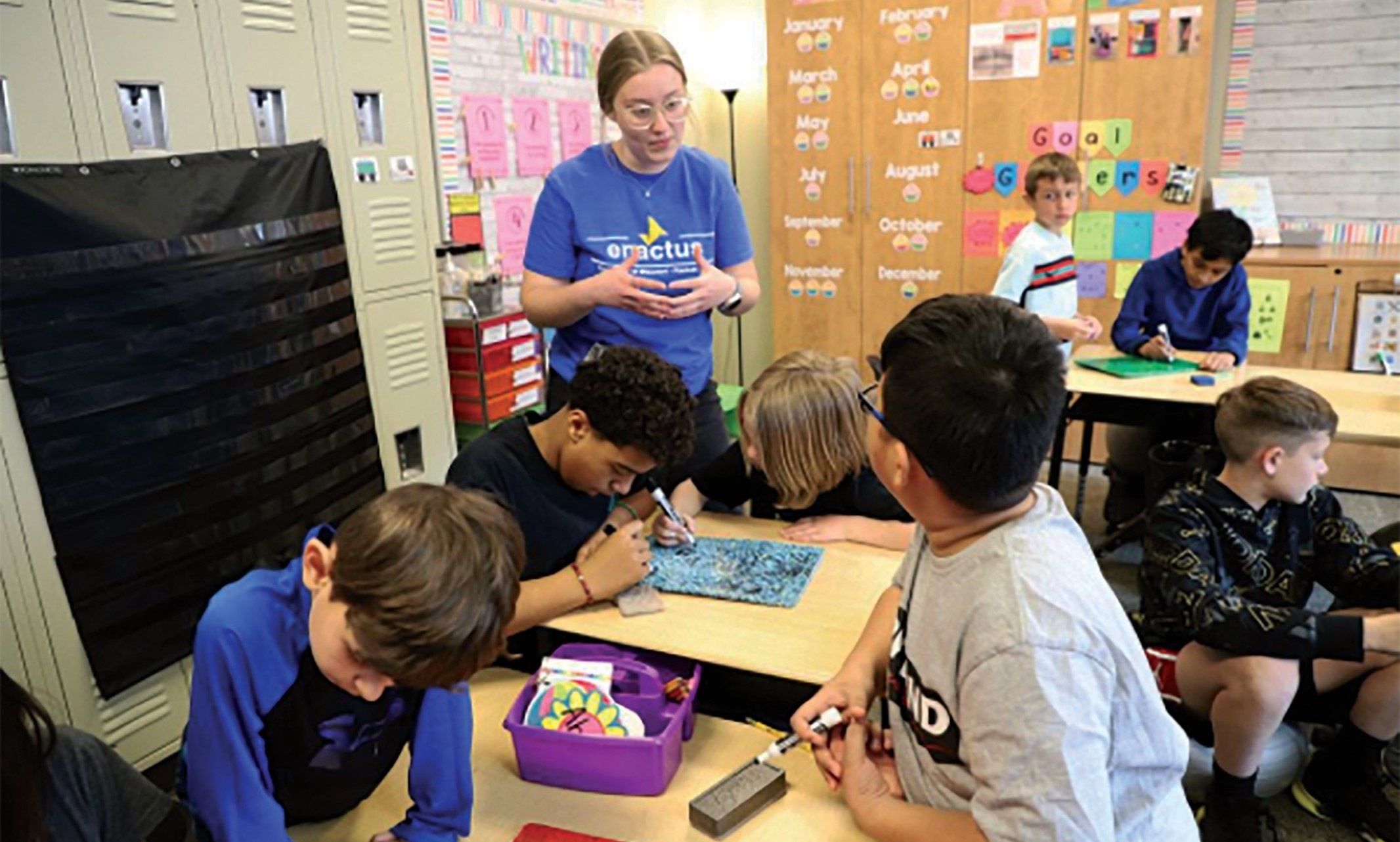
Sustainable projects carry team to eighth in the nation
For a second year in a row, the UMKC Enactus team has broken into the semi-final round of the Enactus USA Competition, beating dozens of teams from across the country to place eighth in the overall competition.
The competition, held in mid-April, drew more than 500 students from 51 American universities to the University of Texas at Dallas. Each team was given 12 minutes to share their innovative new business ventures, with an emphasis on how those projects are affecting positive change.
“Our students answer needs in a community using social entrepreneurship and create projects that are supposed to be sustainable,” says Erin Blocher, faculty advisor and assistant teaching professor for business communication at the Henry W. Bloch School of Management. “They’re using the entrepreneurial process to find a need and uncover solutions using human-centered design.”
Blocher says many teams focus their efforts around answering one or more of the United Nations’ 17 sustainable development goals. The UMKC team focused their presentation around two sustainable projects, Generation Green and Cultura En Tus Manos.
Generation Green is a startup founded by UMKC Enactus in partnership with Shatto Milk Company of Kearney, Missouri. Team President, Marineth Ordinal says the team was inspired by Shatto’s reusable glass bottles but saw room for improvement.
“The one thing that can’t be reused is the bottle cap,” Ordinal says. “One of our team members saw that and asked, ‘what can we do with all of that plastic?’”
Through research, they learned that the caps are made from plastic with a relatively low melting point and that those lids could be turned into reusable dry erase boards for students. So far, they’ve sold more than to several school districts around the Kansas City area.
Cultura En Tus Manos, Spanish for “culture in your hands,” aims to empower Mexican artisans by providing a platform where they can sell their beautifully hand-crafted goods to businesses in the United States. Blocher says inspiration for Cultura came as a product of the pandemic.
“Artisans weren’t getting the same traffic in places like city squares, because tourism had halted. Now part of the students’ roles is to figure out, now that we’re out of the pandemic, does that project move forward? Are there still ways to help and platform those artists and connect them with merchants here in Kansas City?”
UMKC Enactus will continue to work on projects through the summer months, but not all members of the 2023 competition team will be there. The team held its end of year celebration on May 2, saying goodbye to senior members, including Ordinal, who leaves the team in the hands of a new president for a new year.
“I’m really super proud of what we’ve accomplished,” Ordinal says. “I think we’re a team that could make it to finals and maybe go on to represent the United States at the Enactus World Cup. They had better watch out for the team next year because they’re going to be doing a lot of things.”
Jun 22, 2023
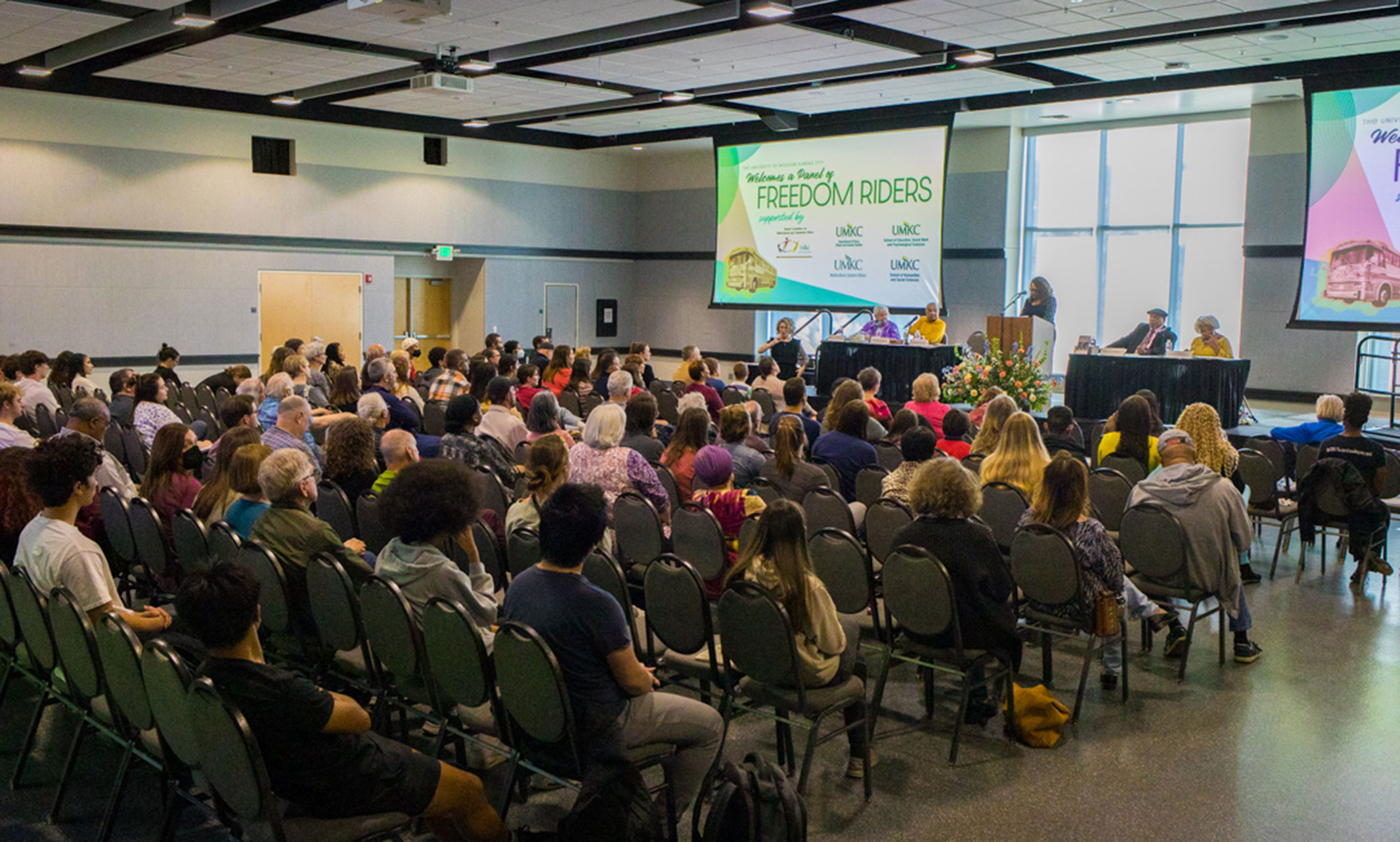
The renowned civil rights activists spoke at panel as part of School of Humanities and Social Sciences Showcase
Four Freedom Riders, civil rights activists who participated in bus trips through the American South in 1961 to protest segregated bus terminals, spoke to their experiences at multiple events around the city, including the UMKC Volker campus.
Here are just a few of their stories:
Dion Diamond began conducting sit-ins as a teenager in his hometown of Petersburg, Virginia. His activism continued at Howard University. He participated in a Freedom Ride from Montgomery, Alabama to Jackson, Mississippi.
“How naive we were,” Diamond said. “We thought the cops and the national guardsmen were there to protect us a little bit. We know that many of them, as soon as they got off the bus , put on their robes, white sheets over their bodies. I have to tell you that it's like the change of the guard at Buckingham Palace with the cops in front of the bus, cops behind the bus, National Guardsmen on the bus and helicopters flying overhead. Let me tell you, we felt safe. As soon as we’d get off the bus, we were arrested under the charge of breach of peace.”
Joan Browning participated in the sit-in movement, picketed segregated stores and facilities, and was the “last Freedom Rider,” the final person selected to join the last Freedom Ride of 1961.
“I never speak without quoting Miss Ella Baker, who was one of those most prominent teachers of young people,” Browning said. “One of the things that she taught me was that social change really comes from ordinary people. You don't have to be rich or famous or go halfway around the world to make the world better. You start right where you are with the people that you are associated with. That’s the key to expanding social justice.”
Lenora Taitt-Magubane, Ph.D., became involved in the civil rights movement while attending Spelman College in Atlanta, where she became a member of the Student Nonviolent Coordinating Committee. Her first sit-in occurred in March 1960 when she participated in an attempt to integrate the Atlanta Municipal Auditorium. Two weeks later, Taitt-Magubane was arrested at a lunch counter sit-in with 77 other students and Martin Luther King Jr.
“It's interesting how things happen,” Taitt-Magubane said. “I was involved in the movement while I was an undergrad, and we planned the movement. One of the house mothers, for example, because we were going out to meetings and coming in very late, gave us the key to the dormitory so we wouldn't wake anyone up. We could go and come as we pleased. And if we were going to do anything, we would confide in her and let her know. We had our books, and we got our assignments. I remember drawing up a schedule, which had study periods, so we weren't just sitting in jail. We had a period of time where we had to study so that when we got out, we could continue classes. And what the faculty did was, they had special classes in their homes and in the school in order to help us catch up and to make sure that we were prepared for our exams. So somehow, all of us graduated.”
Bernard LaFayette Jr., LHD, has authored several works about his long involvement in the American Civil Rights Movement, and his new memoir is “In Peace and Freedom: My Journey in Selma.” The book shares the story of his work as one of the primary organizers of the Selma voting rights movement and the Selma-to-Montgomery marches.
“I needed to get parental permission,” LaFayette said. “So what I did was I wrote to my father down in Florida, and I sent the papers to be signed for him to send them back. And I was the first one in my family to go to college. I assumed he might think it was something related to, you know, financial aid or something like that. I didn't hear anything from him, and time was running out for me to be able to get the application in on time. So, I call on the phone, and I say, ‘Daddy, did you get that letter sent to you that I sent special delivery?’ And he said, ‘Yes, I did get a letter.’ I say, ‘Oh, I'm glad you got it. I thought I got lost in the mail. Could you sign it and send it back right away?’ There was a moment of silence before he said, ‘Do you think I didn't read it?’ I said, ‘Could you just sign it and send a special delivery back so I could get it in right away?’ And you know what his response was? ‘Do you think I'm going to sign your death warrant?’ That's the way he interpreted getting on a Freedom Ride.”
Carmaletta Williams, Ph. D., Chief Executive Officer of the Black Archives of Mid-America, moderated the panel. The event was co-sponsored by the School of Humanities and Social Sciences; the School of Education, Social Work and Psychological Sciences; the Department of Race, Ethnic and Gender Studies; and the UMKC Alumni Association Multicultural and Community Affairs Committee. It was cohosted by Multicultural Student Affairs.
The full panel can be viewed online.
Jun 12, 2023
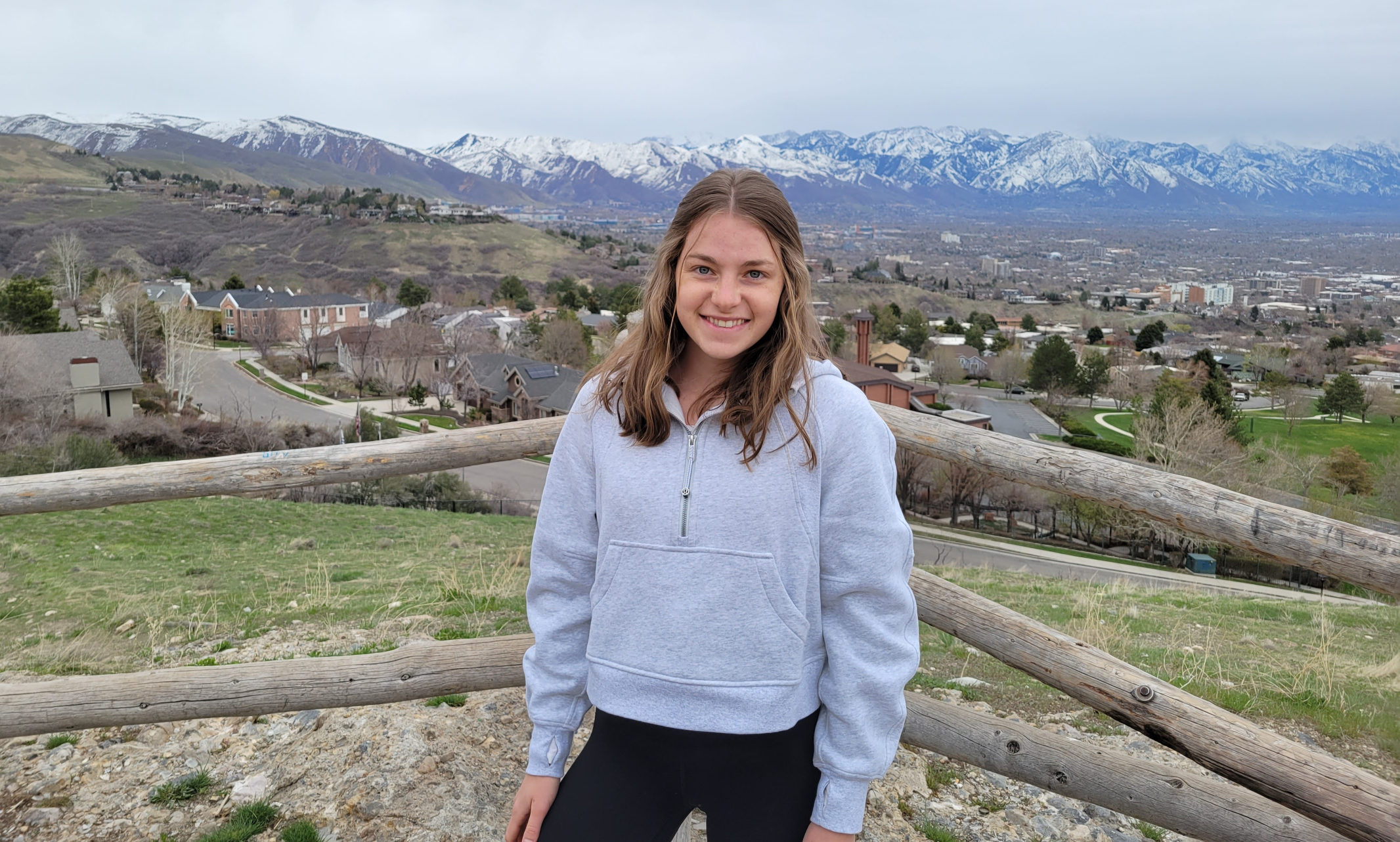
Three receive scholarships to study in Spain, Scotland
Three more UMKC students have received federal grants worth thousands to study abroad this year through the Benjamin A. Gilman International Scholarship program.
The latest grants come in the wake of two earlier study-abroad grants for UMKC students announced in April. The congressionally funded Gilman Scholarship provides financial support to outstanding undergraduate Pell Grant recipients who, due to financial constraints, might not otherwise study abroad.
This latest round of grants includes the first two UMKC recipients of the John S. McCain International Scholarship for Military Families (Gilman-McCain Scholarship), named after the late senator John S. McCain of Arizona. Those scholarships are reserved for children and spouses of active or activated United States military personnel.
Nuria Telles of Kearney, Missouri and Elizabeth Stepp of Kansas City are both participating in a six-week summer program at the University of Málaga, located in southern Spain on the Mediterranean coast. Alison Scobee of Fort Leonard Wood, Missouri, will attend the four-week Honors Summer Program in Scotland.
Stepp, a nursing major, is scheduled to graduate in spring 2024. She is a McCain scholar.
“My dad, Col. Ryan Stepp, has been a C-130 pilot in the Air Force and a member of the Missouri Air National Guard since 1998,” she said. “Along with my mom, he has been the most influential person in my life. I truly would not have the desire to constantly better myself and continue learning Spanish without him. He has traveled extensively throughout his career and knows the importance of learning about other cultures. He encourages me to seek every opportunity to improve my Spanish-speaking abilities.”
Her long-term career goal is to become a certified registered nurse anesthetist. She believes becoming fluent in Spanish will be a career asset, allowing her to care for a wider patient population in the hospital and take part in medical missions.
She said the Gilman-McCain scholarship made the trip a realistic goal.
“It helps me to spend my summer developing my Spanish-speaking abilities by exploring another country rather than working,” she said. “It also allows me to put more money towards furthering my education in the future so I can accomplish my career goals.”
Telles, a Languages and Literatures major who plans to graduate in 2024, also views her study abroad opportunity as a key career driver. She hopes to become a U.S. Foreign Service officer.
“I hope to gain a new perspective on my own culture and my host country’s culture,” she said.
The scholarship has made her experience possible, and she wants to pay the grant forward.
“I would also like to one day have my own scholarship foundation, helping others from underrepresented communities.”
Fellow Gilman-McCain recipient Scobee is a freshman majoring in psychology and chemistry with a minor in medical ethics. She is enrolled in the UMKC Honors Program and is an ROTC cadet.
“I have a huge interest and passion for anthropology, so I'm hoping to gain insight into what studying other cultures is actually like,” she said. “The trip is meant to fully immerse us, so I'm hoping that I learn a lot and can add some anthropological strategies to my toolbelt.”
Her career goal is to become a doctor or a neuropsychologist.
“The Gilman Scholarship is so important to this trip,” she said. “Without it, I definitely would not be going. I'm so excited to have received it because I came into college wanting to study abroad and now I have that opportunity. Honestly, it hasn't quite sunk in yet that I'm going.”
Jun 09, 2023
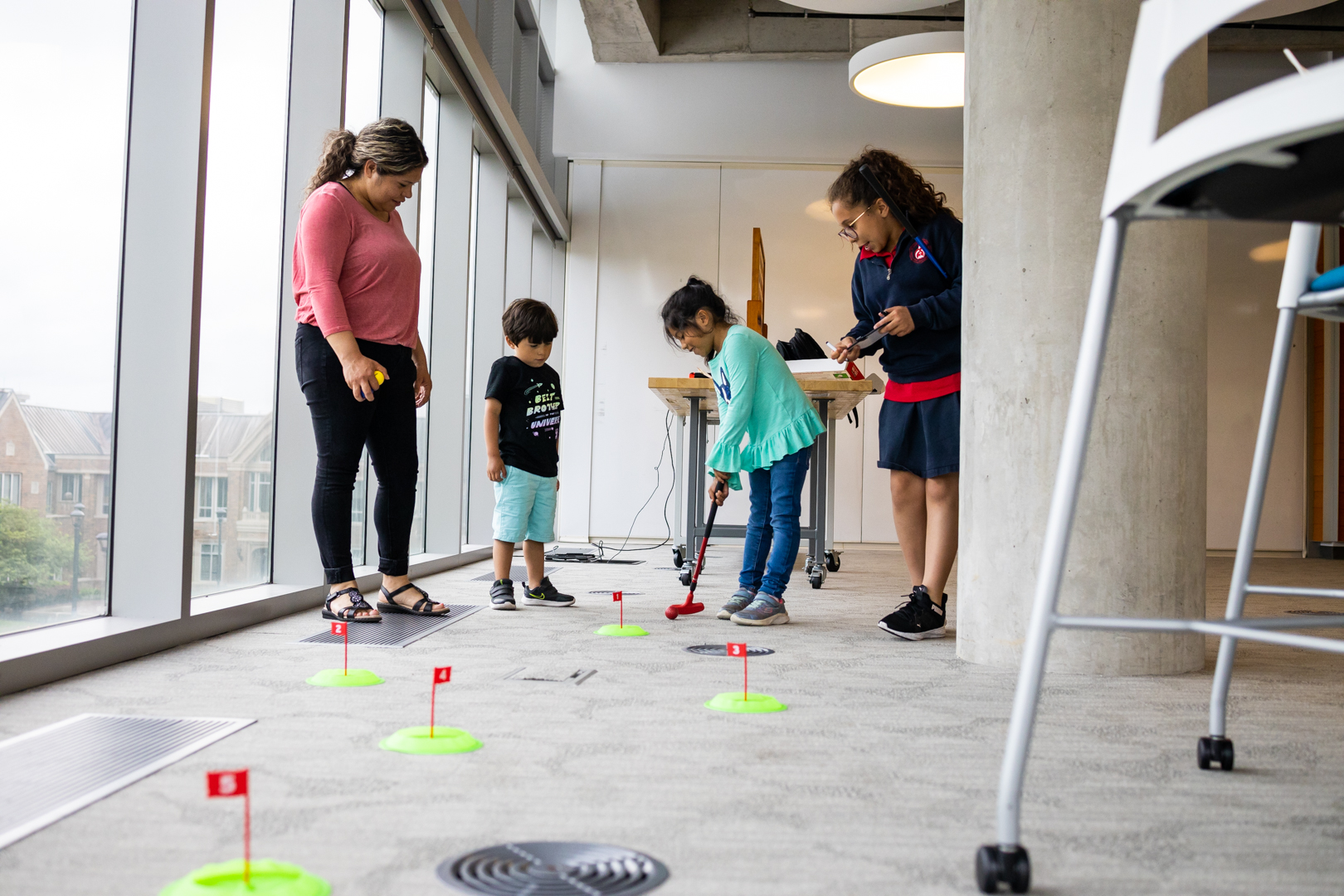
College is a family affair for the De La Cruzes
Roos don't just dream, they do. Our students turn ideas into action every day. Get to know our people, and you'll know what UMKC is all about.
As a real estate agent and a mother of three young children, balancing time is something Angelica De La Cruz has had to master, especially after she added going back to school to pursue a degree in business administration in real estate. Her dedication has inspired her daughters who attend campus events by her side.
“What did I get myself into?” thought 38-year-old De La Cruz as she embarked on a journey to earn her bachelor’s degree from the Henry W. Bloch School of Management.De La Cruz applied for a KC Scholars scholarship in November 2021, not thinking it was a realistic goal. She earned an associate’s degree in 2008 from Donnelly College in Kansas City, Kansas, and joined the workforce without completing a bachelor’s.The scholarship did come through, and as a mother of three at age 37, she decided to attend UMKC part-time as a non-traditional student. She decided to work toward a degree in business administration in real estate, and in her first semester was introduced to the Bloch Launchpad Scholar program. The program offers students professional and leadership development and up to $5,000 in scholarship funding.The only issue: De La Cruz would have to be a full-time student.Already with a full plate, she began having conversations with her family to decide whether going back to school would be worth it as a student with children. They told her she would regret not taking the opportunity.
“It was scary, but I was excited at the same time,” De La Cruz said.The support she received from her family and from faculty at UMKC allowed her to budget her time and finances as she worked toward her goal.“I chose UMKC for its convenient location. When you are a college student, mom, wife and arealtor, you have to juggle several tasks. Convenience is top priority for any decision. In addition, I found a welcoming and supportive environment,” De La Cruz said.She has been a real estate agent for a decade and her goal is to help underserved communities become homeowners by providing education and tools to secure housing and contribute to family wealth.
Born in Villa Madero, Michoacan, Mexico, De La Cruz believes earning a degree is about more than just advancing her career; it’s a chance to honor her parents and inspire her seven and nine-year-old daughters. “I am a first-generation college student. My dad never attended school and my mom only finished third grade. For me to be attending college now, is a way to honor my parents’ hard work and sacrifices they made for me and my siblings to better ourselves,” she said.Balancing school with being a mom means making adjustments and sacrifices. Some days, De La Cruz calls on her family support to help watch her children. But sometimes, thanks to the support system at Launchpad, they’ve gotten the chance to experience college first-hand.“My college program has inspired my daughters to go to college. When they accompany me to a UMKC event, such as Launchpad cohort meeting, basketball game or Honors Program party, they get excited,” she said. “Both leave the campus saying how much they love my school and can’t wait to go to college. Listening to my daughters talk about college, at their young age, brings joy to my heart.”
Jun 08, 2023

UMKC Institute for Human Development and the Missouri Department of Elementary and Secondary Education launch a training and coaching program to en...
Beginning this year, approximately 2,000 early childhood educators in the state of Missouri will have the opportunity to receive training and coaching to improve the quality of early childhood learning programs.
The University of Missouri-Kansas City Institute for Human Development and the Missouri Department of Elementary and Secondary Education are launching a two-year project to enhance early childhood education by building leadership and business skills of early childcare administrators in family childcare businesses and independent learning centers across the state of Missouri. UMKC Institute for Human Development will partner with the UMKC Midwest Center for Nonprofit Leadership, the University of Missouri-St. Louis Community Innovation and Action Center, University of Missouri Extension, the Missouri Small Business Development Centers and Child Care Aware® of Missouri in the project.
Despite their dedication to the field and the families they serve, many family childcare business owners do not have backgrounds in finance and operations, and can face challenges managing a business as they provide outstanding care and support. But fiscally sound, well-run childcare programs are a critical core component of healthy communities and family well-being. In addition, small, independent learning centers may lack support staff, and many directors are former teachers who do not have management training. The Missouri Department of Elementary and Secondary Education program will provide participants training in whole leadership, organizational sustainability and leading change.
Additional resources will be available for both large and small center administrators.
“Large center administrators will receive training in supervision and human resources, strategic financial management and strategic communications strategies, while small center administrator sessions will focus on writing a business plan, understanding financial statements and QuickBooks Online for childcare businesses,” says Mike Abel, UMKC Institute for Human Development associate director, who directs the Early Childhood Innovation Center.
All participants will receive four on-site coaching sessions and eight virtual coaching sessions with trained quality specialists over a one-year period.
“High quality early learning programs are more likely to identify and address developmental delays and learning disabilities at an early age, which may increase the probability for the child’s success in life,” Abel says. “This program will drive a higher level of professionalism among these childcare administrators and lead to an overall higher quality in delivery of their services.”
The Missouri Department of Elementary and Secondary Education program is designed to address these issues through assessment, leadership and business training, on-site and virtual coaching, and the supply of tools and materials across seven regions in Missouri through more than 200 training sessions.
“This training would not be possible without the help of our partner organizations,” said Abel. “They’re providing critical expertise and resources that will greatly enhance the training and coaching to administrators. It is only through their support that the program will ultimately elevate the quality of childcare and enhance the lives of children across our state.”
Jun 07, 2023
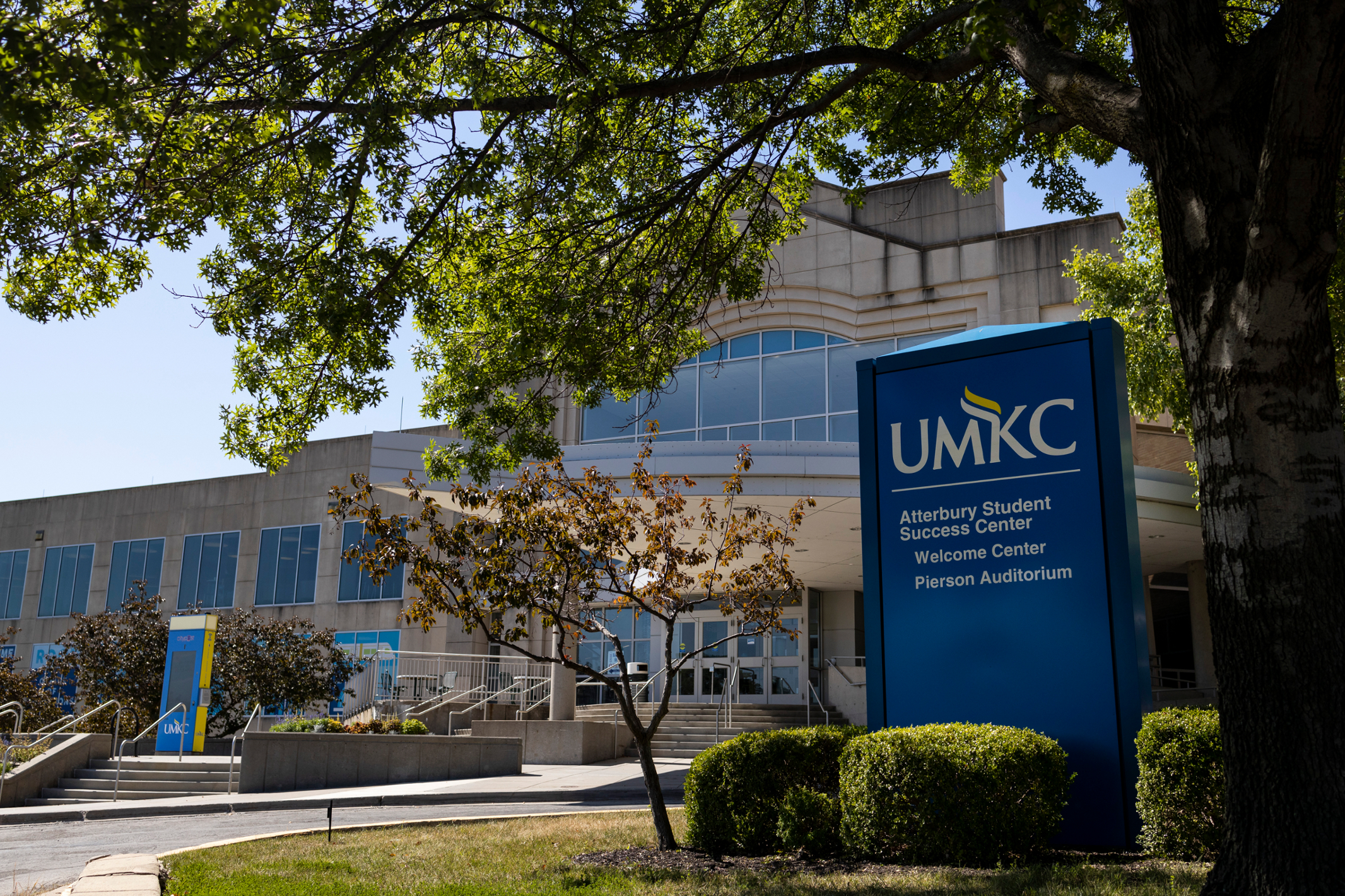
A total of $500,000 was awarded to students, faculty and staff.
The UMKC Entrepreneurship Innovation Grant Program announced 12 recipients out of 28 submitted proposals, totaling $500,000 in awards.
UMKC students, faculty and staff submitted proposals including 13 technology commercial and 15 program and professional development requests in the amount of $1,041,564.Seven grants were awarded to Technology Commercialization projects and five were awarded to Program and Professional Development projects.
The Entrepreneurship Innovation Grant Program is funded by the Kauffman Foundation and is a joint effort by the UMKC Innovation Center, the Regnier Institute at the UMKC Bloch School of Management and the UMKC School of Law.These are the projects awarded grants starting June 1, 2023.
Technology Commercialization
De-risking the Commercialization of a Novel UMKC-Owned Technology to Diagnose Pediatric Glaucoma
An interdisciplinary collaboration between School of Medicine and School of Science and Engineering (SSE) faculty and a talented SSE graduate student. UMKC Tech Transfer has protected the IP with a non-provisional foreign patent application and is actively working with the inventors to commercialize the technology. The first-in-class software technology has the potential to significantly disrupt the field of glaucoma health care, a growing market exceeding $5.5B billion in 2021.Designing a Health IT Prototype to Improve Clinician Communication Across Care Settings
The goal of this project is to identify a feasible, viable, and desirable design for improving efficiency in communication between healthcare entities that do not currently have interoperable health records. By the end of the project, design plans will be prepared to build a minimum viable product and will request more funding to expand testing to additional hospitals, clinics, pharmacies, and LTCFs across Missouri.WeListen: An AI-Empowered Scalable Solution to Obtaining Consumer Insight for Business Development
The primary objective of the proposed project is to conduct consumer discovery research that informs the concurrent development of data querying and visualization tools tailored for our target clients, which include doctors, nurses, practitioners, physicians, and healthcare administrators and managers. Gaining insights into population health and patient experiences is crucial for addressing health disparities and promoting value-driven healthcare. The broader impact of this project is the development of a solution for qualitative consumer data analysis in consumer insight studies across various industries.4-dimensionally printed biodegradable implants for safer membrane elevation in sinus lift procedures
This project includes the design and manufacturing of 4D-printed implant prototypes, well- investigated and FDA approved biodegradable materials for tissue engineering.
Prototype storage in simulated body fluid and testing of mechanical properties at various time points will capture influence of material degradation.
Determination of the implant’s biocompatibility and potential of bone formation on and around the implant via cell culture lab testing
Suitable material compositions will be identified and used in an animal study outside of this EIG project grant
Improving the Capacity of the UMKC Office of Technology Commercialization
This investment creates appealing opportunities for business development by enhancing the process of transferring university technologies to businesses. This project provides opportunities to recruit a graduate assistant from the UMKC School of Law, Henry W. Bloch School of Management students seeking their MBA, and students from the School of Science and Engineering schools, with each student expected to approximately forty (40) hours per month. Leveraging the graduate-level expertise of these students will enhance various aspects of the disclosure review process, market review and planning, and prior art review.
Strengthening Intellectual Property Protections for Drug Development in Diabetes and Other Diseases
Securing patents for the intellectual property that is resulting from National Institute of Health research, as well as new developments that will enable the translation of academic results into groundbreaking therapies, and that has the potential to be extremely lucrative for the university.
UMKC SSE Senior Design Far Field Wireless Power Transfer Project
Funding supports UMKC E&C department senior design class focused on training students to design, implement , and meet milestones and deliverables toward a relevant and timely engineering problem. This project includes the design, implementation and demonstration of wireless power transfer (WPT) systems that operate at 1-5 meters with goals of charging compact batteries to perpetually charge a rotor wing UAS mid-flight for the UMKC E&C senior design project.
Program and Professional Development
Creating a pipeline for Pharmacy Business Entrepreneurship
To create a pipeline of students from high school through professional programs to support student entrepreneurs in getting their PharmD/MBA at UMKC. The grant supports student recruitment beginning in high school and through their pre-pharmacy experience with an emphasis on the business/entrepreneurship FACT program at UMKC School of Pharmacy, to increase in the number of students completing the PharmD/MBA program.Fostering An Entrepreneurial Mindset for Students and Faculty in UMKC’s Digital and Public Humanities Program
Create workshops and an internship program in the School of Humanities and Social Sciences that will inspire participants in the Digital and Public Humanities Program to bring an entrepreneurial mindset to their work. It will help them think about themselves not just as potential employees of arts and humanities organizations but also a s entrepreneurial thinkers who can start their own companies or bring an entrepreneurial mindset to existing positions within arts and cultural heritage organizations.Digital Toolkit, a Course in Creative Entrepreneurship
Create a course in the School of Humanities and Social Sciences called Digital Toolkit to allow entrepreneurs to learn the basic skills to create professional online content with training in design, video and audio production and content creation.Creating Resource-Guiding Relationships in Kansas City's Entrepreneurial Ecosystem
Funding will support the development of a series of master classes designed to introduce aspiring entrepreneurs, including UMKC students, to Kansas City's entrepreneurial ecosystem. Leveraging the expertise of Porter House KC and KC SourceLink, a cohort of entrepreneurs will be given the opportunity to learn from and network with regional experts.UMKC Enactus - Venture Competition Accelerator
Create a “Competition Accelerator Program” for the UMKC Enactus team. The Enactus team develops several student-led social entrepreneurship ventures every year as part of the team’s normal activities. In recent years, Enactus has entered select projects into national entrepreneurship competitions. Participation in these types of events, along with the national Enactus USA competition, are beneficial to the team. and funding enables Enactus to formalize the process for preparing for, applying for, and attending competitions with a Competition Accelerator Program.
Jun 07, 2023
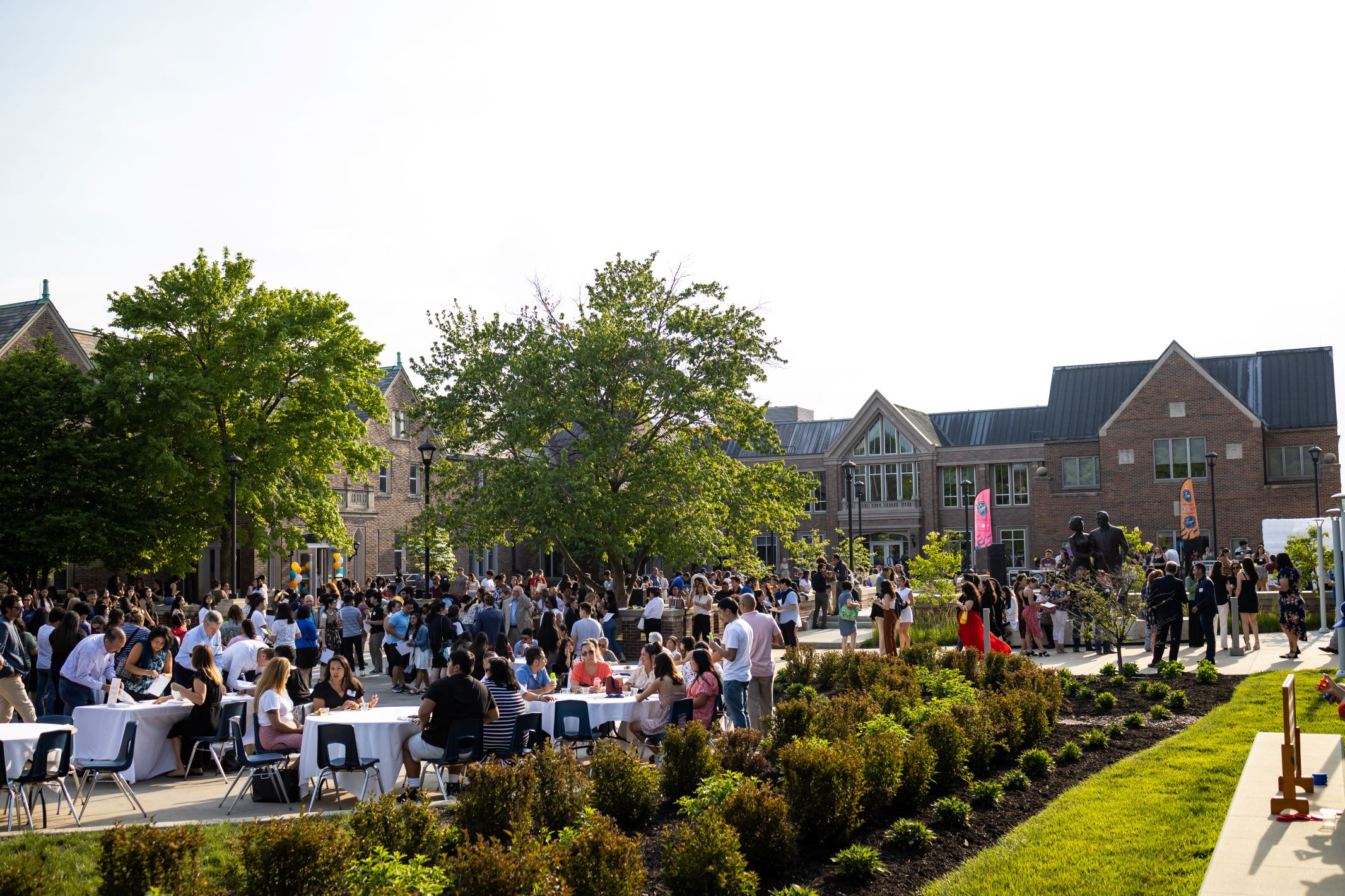
Campus event at Henry W. Bloch School of Management provides information, celebration
The University of Missouri-Kansas City is the No. 1 choice for 60 high school students and 50 current students who received Hispanic Development Fund scholarships for the next academic year.
The event recognizing the scholarship recipients was both informational and a celebration.
“Family and community support is encouraged at the event,” says Scott Ezzell, manager of admissions and recruitment for the Henry W. Bloch School of Management. “This support is such a critical part of the Hispanic Development Scholars’ success. HDF encourages family involvement in all aspects of their programming.”
The Hispanic Development Fund (HDF) awarded its first scholarships in 1984, providing $100 each to 100 students through a separately named Hispanic Scholarship Fund. This year, in partnership with local and regional higher education institutions, HDF awarded more than $1 million to 550 scholars.
UMKC hosted the scholars and their families at the Bloch School of Management for the first time in several years due to the pandemic. Students received detailed information about their opportunities and the partnering organizations, but one of the most important elements of the event was the opportunity for the students and their families to celebrate their success.
Gabriela Urrea is a sophomore pursuing her bachelor degree in nursing.
“The scholarship makes a difference. I’m able to worry less about tuition. Alleviating that burden helps me to stay focused on school,” she says.
Phillip St. John is a junior pursuing his degree in business administration.
"I'm in my third year and I’ve received this scholarship the entire time I’ve been at UMKC. It makes a huge difference and takes a lot of stress off of me and my parents.”
Erik Betancourt is a junior pursuing a degree in engineering.
“I wanted to stay close so I can continue to be a part of my community and family. The affordability makes that possible.”
Jazmin Romo, Frida Rodriguez, Leslie Romo
Jazmin Romo is a sophomore pursuing her degree in marketing. “Because of the scholarship I am able to study here and live in the dorm. It provides me an opportunity to really focus on school.”
Frida Rodriguez is pursuing degrees in business and theatre. "This last quarter they really worked with me to help afford school."
Leslie Romo is a sophomore pursuing her degree in business administration and marketing. "Bloch brings great opportunities. Brittany Bummer in Enactus has been very helpful."
Daisy Garcia Montoya is a senior pursuing her masters in public administration. “The scholarship alleviates my worry about financial aid and allows me to focus on school and work full time. I’ve felt seen. If I ask for help, I receive it. It’s a whole different support system.”
Jun 05, 2023
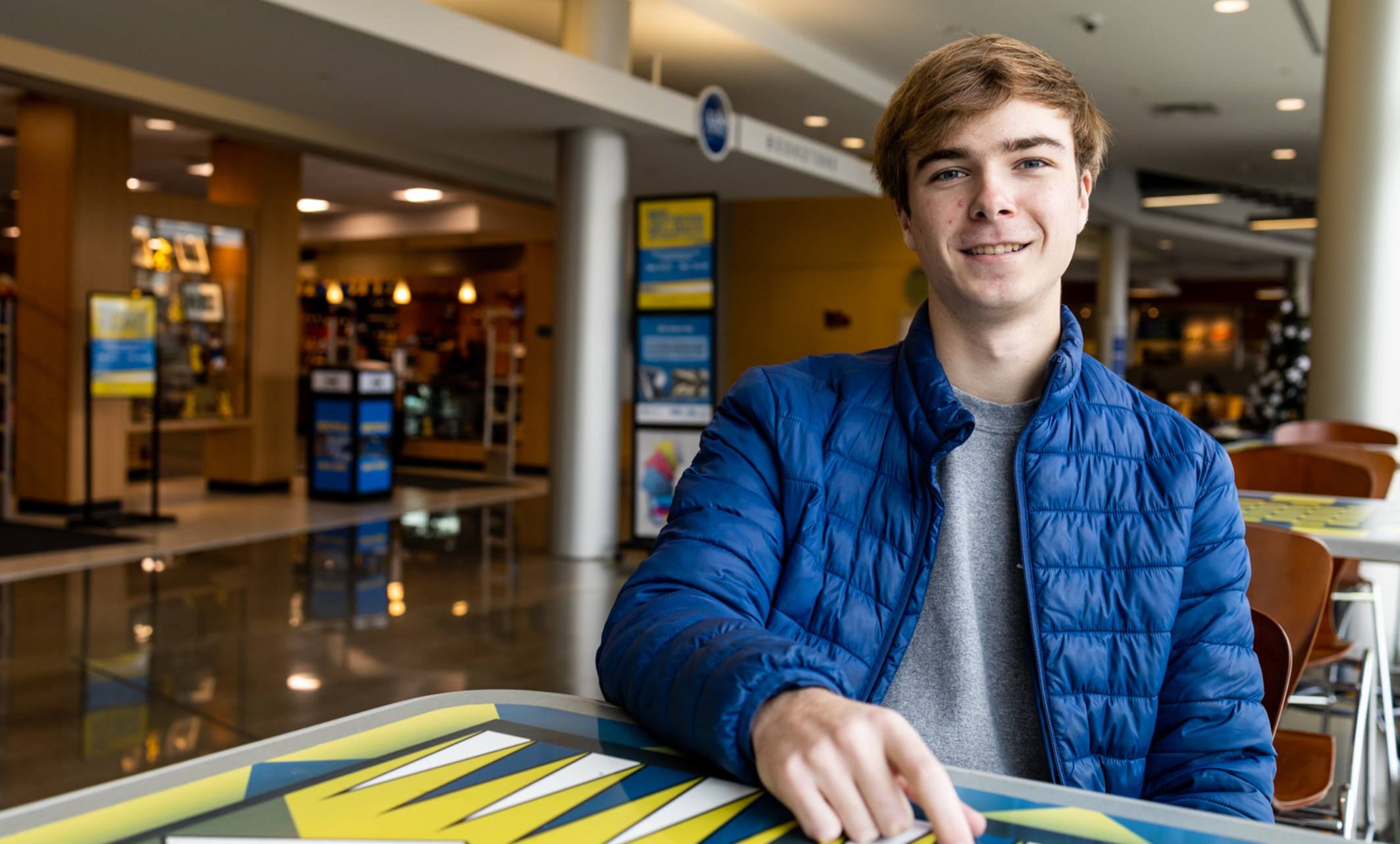
Meet Alexander Rose, a member of the first-ever class from UMKC Professional Career Escalators
Roos don't just dream, they do. Our students turn ideas into action every day. Get to know our people, and you'll know what UMKC is all about.
Alexander RoseAnticipated Graduation Date: 2026Academic Program: health care track, Professional Career EscalatorsHometown: Wentzville, Missouri
Alexander Rose is a career-focused freshman, and the prize that draws his eyes is practicing medicine. That’s why he enrolled in the new program that provides a direct pipeline from campus to professional success, UMKC Professional Career Escalators.
The Professional Career Escalators program provides him with special mentoring opportunities, career-focused advising, extra financial aid and, most importantly for him, a spot in an on-campus living-learning community with other Professional Career Escalators students.
“I believe that the ability to engage with individuals who are pursuing a path similar to your own, especially those wishing to go on to a professional school, is a very valuable opportunity that the Professional Career Escalators program offers,” Rose said. “It also pulls from a diverse range of individuals within a track. Like health care, for example. There are pre-med students, nursing students, and pre-physician-assistant students, all of whom have different processes and aspirations.”
The Professional Career Escalators program is a unique, trademarked system of personalized support and services unlike anything being offered across the U.S. It is designed to propel students from their academic studies to high-paying careers by providing a defined and guided path from enrollment to workforce.
The program prepares students for careers in four key areas of workforce demand: law and justice, engineering and business, education and health care. Each semester, students participate in the five Professional Career Escalators core experiences: career guidance and development; experiential learning opportunities (such as job shadowing and internships); mentoring with faculty experts and community professionals; graduate and professional school preparation; and leadership development.
Why did you choose UMKC?
I appreciated many factors about the school, from the many professional schools under the UMKC name, to the price tag compared to some other universities. I also liked that it provided me some space from my family while also knowing that they aren’t more than three hours away.
Why did you choose your field of study?
I saw it as a good fit for me since I’ve never really enjoyed math, and while a good portion of math is still required, the focus is on biology and chemistry.
How has your college program inspired you?
My program has inspired me to talk to more individuals in other degree programs, and to consider leadership positions inside and outside of the Professional Career Escalators.
Since entering college, what have you learned about yourself?
That I value connections with people, especially family, but also friends and mentors. These connections can help me and empower those involved more than if they’d not been made.
Do you have any scholarships?
I have financial aid through the Professional Career Escalators that goes towards my housing in the living-learning community. That helps me feel as though I belong in this community, and it provides a recognition for being a part of the Professional Career Escalators. I also have an academic scholarship through UMKC, another factor that drives me to devote mass amounts of time to my studies and my grades.
What other extracurricular activities are you involved in at UMKC?
I am currently a member of Pre-Med Prep, UMKC Pre-Medical Society, Biological Sciences Society, Christian Medical and Dental Association, Emergency Medicine Interest Group and Facilitating Awareness for Rural Medicine (FARM).
What do you hope to take from your experiences at UMKC into your professional career?
I hope to take what I have learned about diversity and leadership to my professional studies and career.
Jun 01, 2023
